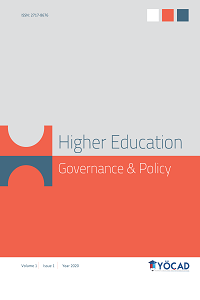Abstract
References
- Afroz, S. (2017). Quality of Work Life: A Conceptual Model. Advances in Economics and Business Management, 4(8), 570-578.
- Aguenza, B. B., & Som, A. P. M. (2018). Motivational factors of employee retention and engagement in organizations. IJAME.
- Almuftah, H. & Lafi, H. 2011. Impact of QWL on employee satisfaction case of oil and gas industry in Qatar. Advances in management and applied economics, 1(2), 107-134.
- Alqarni, S. A. Y. (2016). Quality of Work Life as a Predictor of Work Engagement among the Teaching Faculty at King Abdulaziz University. International Journal of Humanities and Social Science, 6(8), 118-135.
- Anderson, D. M., Morgan, B. L., & Wilson, J. B. (2002). Perceptions of family-friendly policies: University versus corporate employees. Journal of Family and Economic Issues, 23(1), 73-92.
- Argyris, C. (1973). Personality and organization theory revisited. Administrative Science Quarterly, 18, 141-167.
- Arif, S., Ejaz, A. & Yousaf, N. (2017). Career aspirations and opportunity for FWAS: perceptions of Pakistani women. Journal of Management and Research, 4(1), 59-76.
- Arif, S., & Ilyas, M., (2013). Quality of Work- life model for Teachers of Private Universities in Pakistan. Quality Assurance in Education, 21(3), 282-298.
Abstract
Maintaining the quality of work-life (QWL) is a global challenge faced by higher education institutions, and the same is true for the universities of Pakistan. Unless appropriately managed the negative feelings about QWL may adversely impact on attraction, performance, and retention of the faculty in any university. The purpose of this research was to gather the perceptions of faculty to explore interrelationship of QWL attributes, work-life balance (WLB), and career satisfaction (CS). For this survey, a correlational research design was opted to gather perceptions of the faculty teaching in the universities of Lahore. The researcher used the cluster sampling technique to get a target sample comprising 300 faculty members. The sample was drawn from six (3 public and 3 private) universities of Lahore. Descriptive and inferential statistics were applied for the analysis and interpretation of data. Pearson Product Moment Correlation confirmed the association between the variables; regression analysis identified the predictive value of QWL attributes and WLB for career satisfaction. The study concluded that the achieved status of work-life balance strongly predicts career satisfaction. However, perceptions of inequality regarding faculty promotions, distribution of workload, and allocated work hours affected QWL negatively. Faculty also disagreed that their employers provide adequate facilities and flexible working hours to manage work-life balance (WLB). The findings and results will assist leadership and faculty in the practical implementation of quality work-life programs to improve the retention of current employees and attract quality employees in the future.
Keywords
job satisfaction higher education quality of work-life work-life balance university faculty
References
- Afroz, S. (2017). Quality of Work Life: A Conceptual Model. Advances in Economics and Business Management, 4(8), 570-578.
- Aguenza, B. B., & Som, A. P. M. (2018). Motivational factors of employee retention and engagement in organizations. IJAME.
- Almuftah, H. & Lafi, H. 2011. Impact of QWL on employee satisfaction case of oil and gas industry in Qatar. Advances in management and applied economics, 1(2), 107-134.
- Alqarni, S. A. Y. (2016). Quality of Work Life as a Predictor of Work Engagement among the Teaching Faculty at King Abdulaziz University. International Journal of Humanities and Social Science, 6(8), 118-135.
- Anderson, D. M., Morgan, B. L., & Wilson, J. B. (2002). Perceptions of family-friendly policies: University versus corporate employees. Journal of Family and Economic Issues, 23(1), 73-92.
- Argyris, C. (1973). Personality and organization theory revisited. Administrative Science Quarterly, 18, 141-167.
- Arif, S., Ejaz, A. & Yousaf, N. (2017). Career aspirations and opportunity for FWAS: perceptions of Pakistani women. Journal of Management and Research, 4(1), 59-76.
- Arif, S., & Ilyas, M., (2013). Quality of Work- life model for Teachers of Private Universities in Pakistan. Quality Assurance in Education, 21(3), 282-298.
Details
| Primary Language | English |
|---|---|
| Subjects | Other Fields of Education |
| Journal Section | Research Articles |
| Authors | |
| Publication Date | December 30, 2020 |
| Published in Issue | Year 2020 Volume: 1 Issue: 2 |


